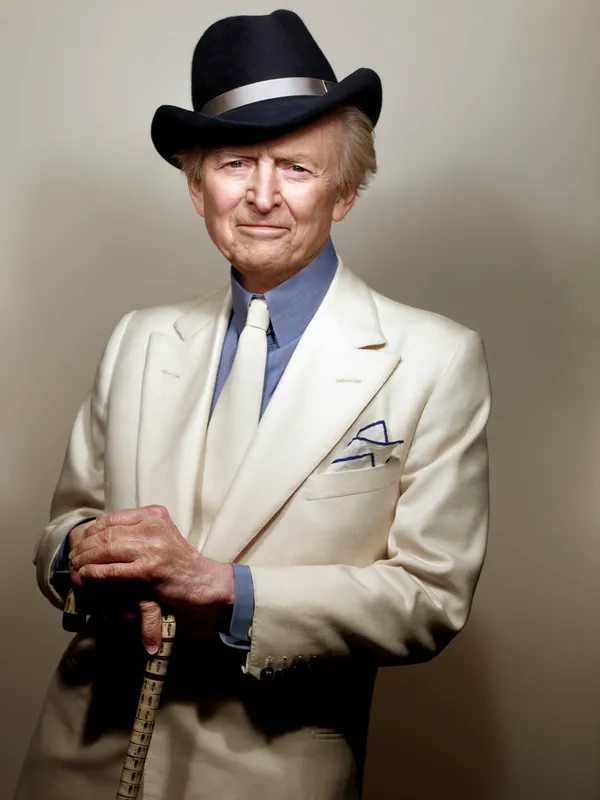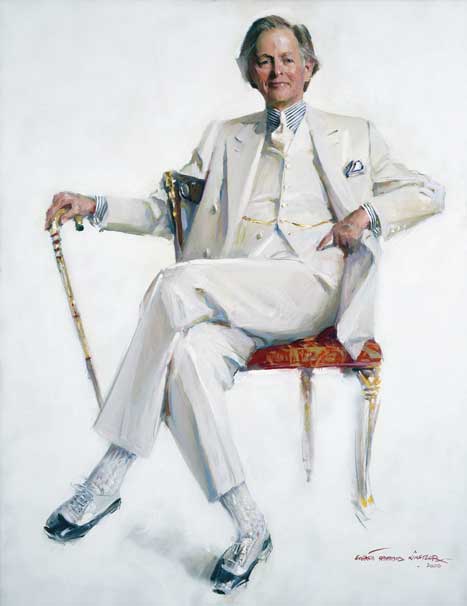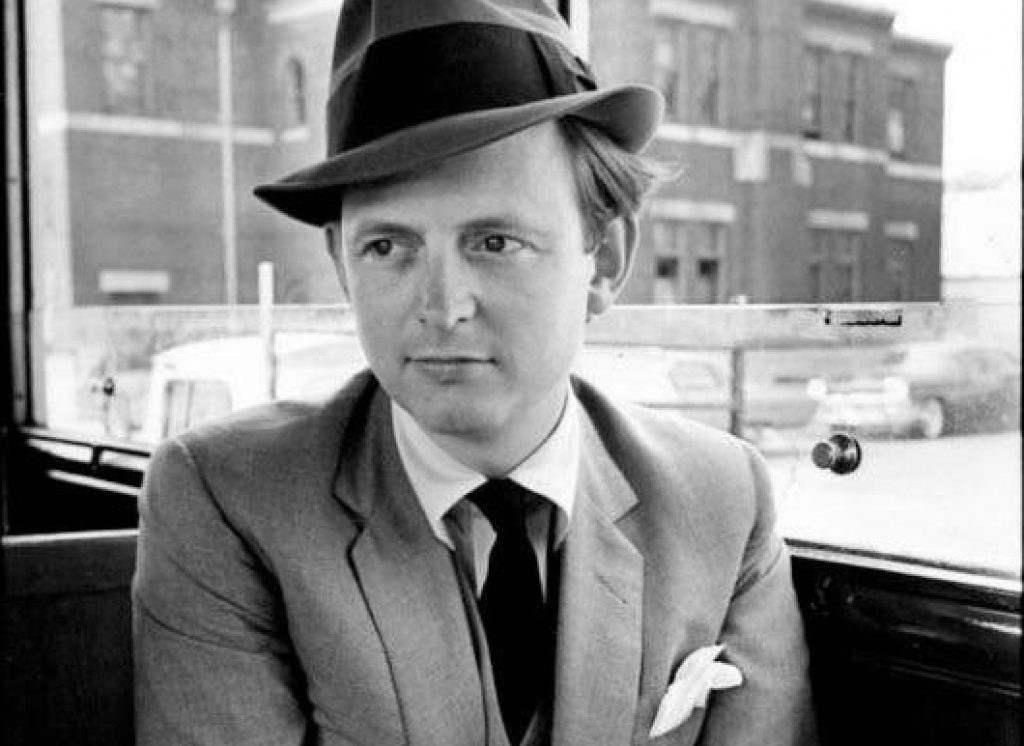“‘You’re nobody until somebody hates you,’ Wolfe liked to say.”

Tom Wolfe, New York’s most gleefully bitchy social observer, would have been too good for us today opines JANET MERCEL. But oh, how he would have reveled in our arenas of social media and news ticker tape—click click—a relentless spectacle lifted straight from one of his onomatopoeia-stuffed novels.
At points in his career, Tom Wolfe was regarded as the most famous writer in the country—no easy feat for a golden moment in American literature. Annoying people was often reason enough for him to do anything, and he cheerfully counted among his legendary squabbles and enemies The New Yorker, J.D. Salinger, John Updike, and John Irving—literary contemporaries who spent their airtime either lamenting how much time they wasted thinking about Wolfe, or making sure the American public knew he was on the wrong side of entertainment versus literature. When they sniped that his main talent was “kitsch,” he pointed out that what really made them grumpy was that he’d sold too many books.
“You’re nobody until somebody hates you,” Wolfe liked to say. “With a pen, he was a terrorist,” his old friend, Gay Talese, tells Avenue. “He could cut a man in pieces with a single sentence,” another critic described. But for someone who spent five years at Yale getting his PhD, he still—or maybe because of it—ended up with a chip on his shoulder the size of a construction site. For Wolfe, the Marx-ism, “I wouldn’t want to belong to any club that would have me as a member,” was less a joke than a guiding principle. Despite his insistence, he spent an awful lot of time convincing himself and everyone else that he wasn’t a hick.

A lifelong preoccupation with the “statusphere” was cemented by Wolfe’s belief that jockeying for social position is a struggle that ceases only when you’re dead—not in solitude, not even in the privacy of the toilet. At least when faced with death, particularly sudden, violent death, he was confident that you don’t think about where you come from or “what restaurants will give you a good seat.”
His own perceived accident of birth (quantified only by being born south of the Mason-Dixon line) ensured that with each soaring success, he made sure to bring himself safely back to earth. Not for him an anonymous account—ahem, column—that trolls the chic intelligentsia or fashionable philistines. He put it all out there and proudly attached his name, taking the piss out of decorators, politicians, captains of industry, philanthropists, and corporate magnates, taxi drivers, mindless teenagers—mindless anything—and people who put too high a value on interiors and landscape gardening. And if anyone made the mistake of putting too high a value on, God forbid, themselves, Wolfe was there to remind them.
“Wolfe despised both the avant-garde and the bourgeois.”
His books and papers covered more ground than a rambunctious kudzu, and he loved to hate it all. The lowbrow: NASCAR, strip clubs, ambitious district attorneys, Hugh Hefner’s bedroom (with its Si Non Oscillas, Noli Tintinnare— “If you don’t swing, don’t ring,” carved on the door). And the high—art collectors, starchitects, Leonard Bernstein. His life’s work was maintaining the difference between journalism and PR, blowing the boring, whitewashed astronauts of Apollo 17 out of the water by exposing their secret lives of sexing and boozing—and therefore getting himself kicked out of NASA. He used the ground rules of spelling and typography as mere suggestions when portraying the human condition. And name one other author who could use an epic battle with a dachshund while escaping to visit your mistress in the rain (The Bonfire of the Vanities) as a tool to convey the Odyssey-level struggle that captures the anxiety and absurdity of being alive (on Park Avenue).

Wolfe despised both the avant-garde and the bourgeois, but perhaps most of all, those who used other people to feel more alive, more real—or worst of all, hip. In Wolfe’s eagle eyes, nostalgie de la boue was the eighth deadly sin, an indulgence for which one should be prepared to repent—just ask the Roquefort cheese-eating guests of “Radical Chic: That Party at Lenny’s.” He was never even invited to that party, after all, but pilfered the RSVP phone number off the desk of his wife’s colleague at her office. From there, he continued breaking the rules, torching both the Bernstein’s’ well-meaning liberal overtures, and their street-cred-seeking cultural flirtation with the Black Panther Party in New York Magazine. The Panthers may not have cared all that much about the attention, but the former camp and their set never forgave Wolfe for the indiscretion.
New York portraits in The Pump House Gang like “Bob and Spike,” about husband-and-wife pop art patrons who use collection as the most direct means of social entrée, is so painfully on the nose it could have been written yesterday, with only small shifts in the who, what, and wheres from 1968. I’d give a lot to see the same guy who mocked the unfortunate eyeliner of pineapple blonde socialites, and the “raggy little puberteens in white Courrèges boots,” turn his attention to Dimes Square and “Get Ready With Me” videos. (Though, frankly, from the vantage point of a contemporarily keen pre-1990 Wolfe, not the somewhat bewildered Wolfe of 2012.)
So how did he survive and thrive while pulling out the innards of everyone he knew, while Truman Capote’s life unraveled after one little story at La Côte Basque? Why didn’t the haute monde come after him with torches? Well, they did—but Wolfe was never sorry, and never stopped, and after a while, it was just easier for everyone to pretend they were in on the joke…even if every hostess of note from here to Santa Monica was quaking in her boots at the mention of his name.

